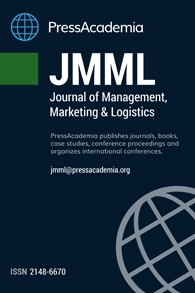AN INVESTIGATION ON AIRLINE CUSTOMERS’ LEVEL OF LOYALTY AND TRUST IN RELATION TO DEMOGRAPHICS, USE OF AIRLINES AND TICKET-PURCHASING HABITS
AN INVESTIGATION ON AIRLINE CUSTOMERS’ LEVEL OF LOYALTY AND TRUST IN RELATION TO DEMOGRAPHICS, USE OF AIRLINES AND TICKET-PURCHASING HABITS
Loyalty, trust demographics, habits, ANOVA,
___
- Alalwan, A. A., Dwivedi, Y. K., and Rana, N. P. (2017). Factors influencing adoption of mobile banking by Jordanian bank customers: Extending UTAUT2 with trust. International Journal of Information Management, 37(3), 99-110.
- Altıntaş, M. H. (2000). Tüketici davranışları: Müşteri tatmininden müşteri değerine. Alfa Basım Yayım Dağıtım.
- Binsar Kristian, P. (2014). Analysis of Customer Loyalty through Total Quality Service, Customer Relationship Management and Customer Satisfaction. International Journal of Evaluation and Research in Education, 3(3), 142-151.
- Chen, S. C., and Quester, P. G. (2015). The relative contribution of love and trust towards customer loyalty. Australasian Marketing Journal (AMJ), 23(1), 13-18
- Chung-Herrera, B. G. (2007). Customers' psychological needs in different service industries. Journal of Services Marketing, 21(4), 263-269
- Colquitt, J. A., Conlon, D. E., Wesson, M. J., Porter, C. O., and Ng, K. Y. (2001). Justice at the millennium: a meta-analytic review of 25 years of organizational justice research.
- Çatı, K., and Koçoğlu, C. M. (2008). Müşteri İlişkileri Yönetimi. Güncel Pazarlama Yaklaşımlarından Seçmeler, Ankara: Detay Yayıncılık.
- DEMİR, C., and ÖZTÜRK, U. C. (2013). ÖRGÜT KÜLTÜRÜNÜN ÖRGÜTSEL BAĞLILIK ÜZERİNE ETKİSİ VE BİR UYGULAMA. Dokuz Eylül Üniversitesi İktisadi ve İdari Bilimler Fakültesi Dergisi, 26(1).
- Doney, P. M., and Cannon, J. P. (1997). Trust in buyer-seller relationships. Journal of marketing, 61, 35-51.
- Duffy, D. L. (1998). Customer loyalty strategies. Journal of consumer marketing, 15(5), 435-448.
- Dwyer, F. R., Schurr, P. H., and Oh, S. (1987). Developing buyer-seller relationships. The Journal of marketing, 11-27.
- Fornell, C., and Larcker, D. F. (1981). Evaluating structural equation models with unobservable variables and measurement error. Journal of marketing research, 39-50.
- Garbarino, E., and Johnson, M. S. (1999). The different roles of satisfaction, trust, and commitment in customer relationships. the Journal of Marketing, 70-87.
- Gronroos, C. (1990). Relationship approach to marketing in service contexts: The marketing and organizational behavior interface. Journal of business research, 20(1), 3-11.
- Hapsari, R., Clemes, M. D., and Dean, D. (2015). The Role of Customer Engagement in Enhancing Passenger Loyalty in IndonesianAirline Industry: Relationship Marketing Approach. Asia-Pacific Management and Business Application, 3(3), 135-144.
- Kandampully, J., and Suhartanto, D. (2000). Customer loyalty in the hotel industry: the role of customer satisfaction and image.
- International journal of contemporary hospitality management, 12(6), 346-351.Kim, W. C., and Mauborgne, R. (2003). Fair process: Managing in the knowledge economy. Harvard Business Review, 81(1), 127-136.
- Kim, W. C., and Mauborgne, R. (1997). Value innovation: The strategic logic of high growth. Harvard Business School Pub.
- Kwon, I. W. G., Suh T. (2004). Factors affecting the level of trust and commitment in supply chain relationships, Journal of supply chain management, 40(1), 4-14
- Lee, J., Lee, J. N., and Tan, B. C. (2015). Antecedents of cognitive trust and affective distrust and their mediating roles in building customer loyalty. Information Systems Frontiers, 17(1), 159-175.
- Lin, H. H., and Wang, Y. S. (2006). An examination of the determinants of customer loyalty in mobile commerce contexts. Information and management, 43(3), 271-282.
- Mayer, R. C., Davis, J. H., and Schoorman, F. D., (1995). An integrative model of organizational trust, Academy of management review, 20(3), 709-734.
- McMahon-Beattie, U., Yeoman, I., Palmer, A., and Mudie, P. (2002). Customer perceptions of pricing and the maintenance of trust. Journal of Revenue and Pricing Management, 1(1), 25-34.
- Molinillo, S., Gómez-Ortiz, B., Pérez-Aranda, J., and Navarro-García, A. (2017). Building Customer Loyalty: The Effect of Experiential State, the Value of Shopping, and Trust and Perceived Value of Service on Online Clothes Shopping. Clothing and Textiles Research Journal, 0887302X17694270.
- Moorman, C., Zaltman, G., and Deshpande, R. (1992). Relationships between providers and users of market research: The dynamics of trust within and between organizations. Journal of marketing research, 29(3), 314.
- Morgan, R. M., and Hunt, S. D. (1994). The commitment-trust theory of relationship marketing. The journal of marketing, 20-38.
- Prentice, C., and Loureiro, S. M. C. (2017). An asymmetrical approach to understanding configurations of customer loyalty in the airline industry. Journal of Retailing and Consumer Services, 38, 96-107.
- Too, L. H., Souchon, A. L., and Thirkell, P. C. (2001). Relationship marketing and customer loyalty in a retail setting: a dyadic exploration. Journal of Marketing Management, 17(3-4), 287-319.
- Walsh, G., and Beatty, S. E. (2007). Customer-based corporate reputation of a service firm: scale development and validation. Journal of the academy of marketing science, 35(1), 127-143.
- Wetsch, L. R. (2006). Trust, satisfaction and loyalty in customer relationship management: an application of justice theory. Journal of Relationship Marketing, 4(3-4), 29-42.
- Winer, R. S. (2001). A framework for customer relationship management. California management review, 43(4), 89-105.
- Yayın Aralığı: Yılda 4 Sayı
- Başlangıç: 2014
- Yayıncı: PressAcademia
SUPPLY CHAIN PERFORMANCE: MEASURING THE IMPACT OF SUPPLY CHAIN ORIENTATION AND BRAND EQUITY
Ebru SURUCU, Gul DENKTAS SAKAR
Himmet KARADAL, Zafer ADİGUZEL, Melike ARTAR
Martin Boakye OSEİ, Celal Hakan KAGNİCİOGLU
A COMPARATIVE ANALYSIS OF USER INTERACTION OF TWITTER FOR TURKISH AND FOREIGN NEWS AGENCIES
